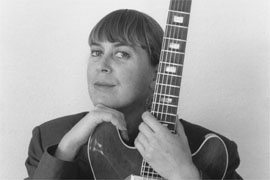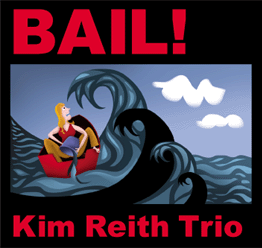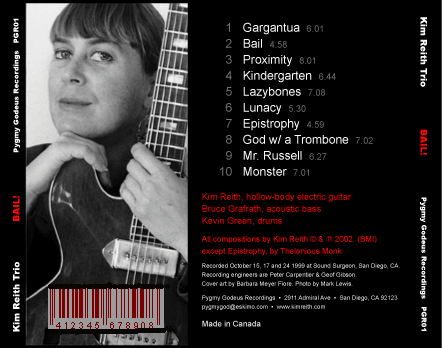- David "Skinny Devil" McLean
originally published at Tinfoil Music
Date: Tuesday, April 06 2004 @ 15:26:25 BST
Kimi Reith is a unique jazz guitarist with a most ingenious
approach to composition & improvisation. This California girl will
definitely catch your ears, whether you hear her live or listen to her
CD, "BAIL!".
Kimi, in the interview below, expounds
openly about her music - which is where, of course, the focus should be.
Be sure to check out her web-site
for detailed liner notes, including theoretical ideas that are at the
core of her fabulous compositions. But first, check out this great
interview!
=====
1) What are your current projects?
You
might say I'm woodshedding. I recently went back to school to get my
BA, so when I'm not doing homework I'm working mainly on chord melodies
and playing skills that I can practice alone at weird hours when
everyone else is asleep -- whenever I manage to free up some time for
practice. I never really got into Latin jazz, bossas, or sambas, but
over the last year or so I tried to improve my bossa technique a bit.
Brazilian bossas and sambas are generally in 2/4 time, and they put very
strict emphasis on hitting the bass notes on the downbeats (in 2/4
time, these are beats 1 and 2).
Most of the Latin jazz I've attempted
has converted this same idea to the 4/4 time signature, in which these
same bass notes would be played with the thumb on 1 and 3. Whichever
time signature you're thinking in, in both bossas and sambas they
syncopate all the rhythms plucked by the fingers on the high notes. The
bass notes provide a rock-like, unvarying context for these interesting,
shifting, syncopated rhythmic figures -- which come from African
musical traditions; they're polyrhythmic.
But
because I never had any real training in Brazilian music, in my
versions of Latin tunes I used to syncopate the bass notes too. I mean, I
did whatever I felt like. But, as I said, I put in a little time over
the last year trying make my bossas more authentic by playing the bass
notes in the Brazilian places. At my last solo gig somebody said they
really liked the way I did One Note Samba. That inspired me to try to be
more systematic in learning bossa and samba chord patterns; lately I'm
focusing on that a lot, and simultaneously attempting to improve some
rather insidious thumb-technique habits. In classical guitar technique,
you're not supposed to bend the first knuckle of your thumb when you hit
the string, but I've always done this -- never studied classical.
Supposedly when you bend the knuckle it puts too much stress on that
joint. If you spend hours practicing techniques that use the thumb, and
you have lousy thumb technique, you might notice soreness at that joint
-- as I did when I got more into practicing Brazilian patterns. So now
I'm trying to break that nasty habit!
2) How does this (do these) differ from your past work?
Well,
in the past I didn't play much with my fingers -- sometimes I did it
for variety of sound or for a softer effect during a bass solo, but I've
mainly used a flat pick both for comping and for single lines. Back
when I was first learning jazz guitar, I spent lots of time on flatpick
technique. There's a small world of stuff to learn there too! So that's
what's new on the technique end.
After
recording my album BAIL!, a couple of years ago I was mainly working on
playing my own original compositions in a trio context, with a fretless
bassist and a drummer. That was very satisfying for me creatively, and
also good for chops. The problem was finding performance opportunities
for a progressive jazz band in the LA area. I have to confess, about a
year ago I got very sick of not finding gigs. I put my trio project
aside for awhile and began focusing on solo material. I would like to
get back to doing my own compositions with a band, but working on
chord-melodies for solo jazz guitar can be fascinating too. I like to
re-harmonize tunes. Finding and learning challenging voicings for
standards and jazz ballads is a vortex -- there's so much more to learn
ALWAYS. I believe you can do a bit more with subtle techniques, chord
voicings, and "quiet" nuances with solo guitar than you can in the
context of a band. A lot gets swallowed up by the sheer din of multiple
instruments, unless people play very sensitively. On the other hand,
there's nothing like playing with a good bassist and a good drummer!
Playing with other people is a very spiritual high.
The
third thing I started focussing on a lot about six months ago was
improving my sight-reading skills. It's easy for guitarists to rely on
playing by ear; it's a folk instrument, and we don't usually get the
kind of school-band training that brass and reed instruments -- and even
drummers -- get in high school. Consequently, in ensemble situations
guitarists are often the weakest readers. In the past, I was no
exception to that tendency, but I really want to improve my reading
skills. So I practice sight-reading a lot.
3) Do you have one project that you are most proud of as a guitarist?
Hmm,
I guess I like some of my compositions a lot, and since BAIL! featured
nine of my compositions I'm proud of that. I tried to do new things with
chord progressions by working organically with melody, then afterward
figuring out chord progressions that would fit. In a sense this is
working backwards from the way most people seem to compose, but I
suspect Wayne Shorter is an example of a jazz composer who also tended
to work this way. If you look at his progressions for tunes like Fee Fi
Fo Fum -- which is one of my favorite tunes to play -- his progressions
are very idiosyncratic, and seem to have been determined by an eccentric
melody. His piece Nefertiti is also like that. On my album BAIL! I used
a lot of odd chord progressions and some funny mixes of time
signatures.
4) Can you give our readers a run-down of your basic gear (live and/or studio)?
Sure,
when I recorded BAIL! I actually had a pretty crummy amp -- a old
orange 60 watt Roland Cube. Wish I'd had the amp I have now! It's a 60
watt Polytone Mini-brute. It only weighs about 50 pounds, so it's ideal
for gigs too. It has a very clean sound -- I tend to use very few
effects. At the most I'll crank the reverb up to 2. I use D'Addario
Chromes, Jazz Light Gauge strings -- they're flat wounds, going from
.011 to .050 gauge. The third string is wound -- which has a fuller
sound, and on my guitar is crucial to avoid buzz. My guitar is a 1978
Aria-ProII, Herb Ellis model. It was designed by him. I was told its
body is like that of a Gibson L-7, and its neck like that of a Gibson
ES-175. It's pretty much the standard electric hollow-body jazz guitar,
with F-holes, 3-3/4 inches deep. Instead of using a strap, I use this
thing classical players use, called a guitar rest (like many jazz
guitarists, I sit down when I play). The rest is a little triangular
device -- it cradles the guitar right on your thigh, but elevates it
high enough to be able to play freely without crouching over. Much
easier on the neck and shoulders! The particular brand I use is called a
NeckUp. I recommend that brand because I tried another type and it
broke after only a year. This one's lasted quite some time now. A few
years ago I discovered the Monster Cable. It's supposed to cut down on
noise during recording. It might be the placebo effect, but it seems to
do that. It has a lifetime guarantee, and I saved my receipt, so I
figure I'm cool. The only other piece of gear I feel passionate about
(in fact, the only other piece of gear I use) is the type of flatpick I
use. I know that sounds a bit precious, but I can hear the difference
between a good pick and a lousy one. I thought for awhile I might be
imagining the difference until I got into a conversation with my local
small-music-store owner. I kept throwing out picks as they got old
because they sounded wrong, which sometimes happened after only one gig.
I told the music store guy that when picks wore out they made a
scratchy sound instead of the smooth sound I like. He explained that
cheap picks are cast from old pick-dies, which have deteriorated with
age. This causes the edges of picks cast in them to already have teeny
divets, which rub against the strings and produce a scratchy sound. So I
heartly recommend using a premium pick, which are cast from brand-new
dies. I use the premium-grade Fender Heavy. They have an abalone-shell
appearance, which also looks good.
5) Who would you cite as early influences, and who are you favorite new players?
Hmm...early
influences were bebop horn players, like Charlie Parker. Then for
awhile I could barely listen to anything but Eric Dolphy and Coltrane.
Sonny Rollins, Steve Lacy...then I got into trumpet players -- Lee
Morgan, Freddie Hubbard. Finally I discovered a few guitarists I liked!
The first one was Joe Pass, then Linc Chamberlain. I got way into Grant
Green. James Blood Ulmer is one of my favorite guitarists, and he opened
up a whole new world of guitar thinking for me, which in a sense was
like a bridge between that wild rock 'n' roll guitar sensibility and
jazz guitar sensibility, even though he doesn't play like a rock player.
And Wes Montgomery, naturally! Eugene Chadbourne's freedom of
expression and exuberance influenced me. The 3 other guitarists that
leap to mind as virtuoso jazz players -- that I hope have influenced me
-- are Kevin Eubanks, Mark Whitfield, and Kenny Burrell. I don't really
try to cop licks; it's mainly players' overall sensibility and my
impression of their style and rhythmic sense that influences my playing.
I've also been very influenced by the compositional style of Charles
Mingus, who was influenced by Ellington. Lately I've been working out
chord melodies for a few Ellington and Strayhorn pieces. Really the
guitarists who have probably had the most impact on the particulars of
my playing are the teachers I studied with: Marlena Teich, Duncan James,
Art Johnson, and a little bit with Pat Kelley. Art was taught by Barney
Kessel, who was an early influence on me before I studied with Art. I
also was very influenced in my musical and compositional thinking by a
pianist I studied with, Rick Helzer.
Hmm,
new players...I was very influenced by the free-thinking of a guitarist
I collaborated with on some long distance 4-track recordings -- though
on the recordings he played fretless bass, for the most part. He was a
free jazz player named Edmund J. Wood, who died unexpectedly in 2002. He
was influenced by people like Ornette Coleman. I guess the newest
players in music that it's possible for anyone to find is people in your
own local community that you can hear live. I mean, it's so new it
hasn't even been recorded yet sometimes! Around the LA area there are
two guitarists I like a lot -- which is fortunate because sometimes they
play together -- Nels Cline and Jim McAuley. As far as newer recordings
I've liked, the last two new releases that really caught my fancy were
"Wandering Moon," by Terence Blanchard, which has a piece on it in 11/4
that blew my mind -- and Greg Osby's album, "The Invisible Hand." That
has both Andrew Hill on piano and Jim Hall on guitar, so it's subtle and
profound. Both those albums contain very understated, cool, and
abstract musical expressions.
6) Can you give a few tips to aspiring players?
One
of the best tips I can give is that the closer you hover your fingers
over the fretboard (the ones that aren't playing the notes at that
moment), the more efficiently you can play.
There's
so much to learn about music that I could probably sit here for hours
thinking of advice! In a sense, the deeper you go into music, the more
music teaches you about itself (and yourself). It's a form of learning
by doing; in a way it's almost like an ascetic spiritual practice. So I
guess the main thing is to practice a lot, and practice consistently --
like every day. But not to over practice to the point where you hurt
yourself. Take little five minute breaks every half hour to be kind to
your hands. Learn some warm-up and stretching exercises to avoid
repetitive stress injuries. Develop little routines with them before
playing every day, so that you ease your fingers into the harsher
realities. Learn to relax as completely as possible while playing,
because you can play faster, more fluidly, and more musically when
relaxed. Learn to enjoy yourself in music, and be kind to yourself.
My
experience with the guitar is that it takes a long time to get anywhere
on the instrument, so go for the long-haul. Early in my guitar studies I
took heart from a Wes Montgomery quote, where he more or less said,
"For a long time, it seemed like everyone was moving on the instrument
faster than me." I thought, "Well, if Wes Montgomery felt like that (!),
maybe someday I'll be able to play!" Because I sure felt like I wasn't
getting anywhere, for many years. It took me awhile to hear and play the
music in music. Listen to the people you play with as you're playing.
When I play solo I like to listen to myself almost like it's someone
else playing. A nice surprise I discovered a few years ago was that if
you're listening, the sounds you hear will tell you what to play next --
which is helpful when you're playing an improvisational form of music.
As you progress and you find yourself getting bored or stale, it just
means you're playing only what you know. So change your routine and
learn challenging new things!
7) What are your future plans?
I
don't know -- I'm at a pretty open place in my life right now. Maybe to
enroll in a jazz performance program somewhere -- I'd like to get a BA
at last, something I never had the slightest urge to do before. I am
always hoping to meet and play with musicians who share some of my
musical values, people I can make meaningful musical exchanges with.
Ideally I'd like to start or join a cooperatively-run jazz band, where
we all share the responsibilities for finding gigs, calling bookers --
the drudge work. I'm interested both in composing music for a band and
in playing other people's compositions, so I'd like to find a group of
people who play and compose too. We could all play each others' stuff.
This type of band is more common in rock than in jazz, where most bands
have bandleaders and side people. I want to meet more people in the
local jazz community and play with them, see what they're about. I'd
like to record a bunch of the trio compositions I've written since
BAIL!, and I'd also like to record an album of solo jazz guitar.
8) Thanx for talking to us, Kimi!
Thank you for your interest in me as a player and a person with things to add to the dialogue.



No comments:
Post a Comment